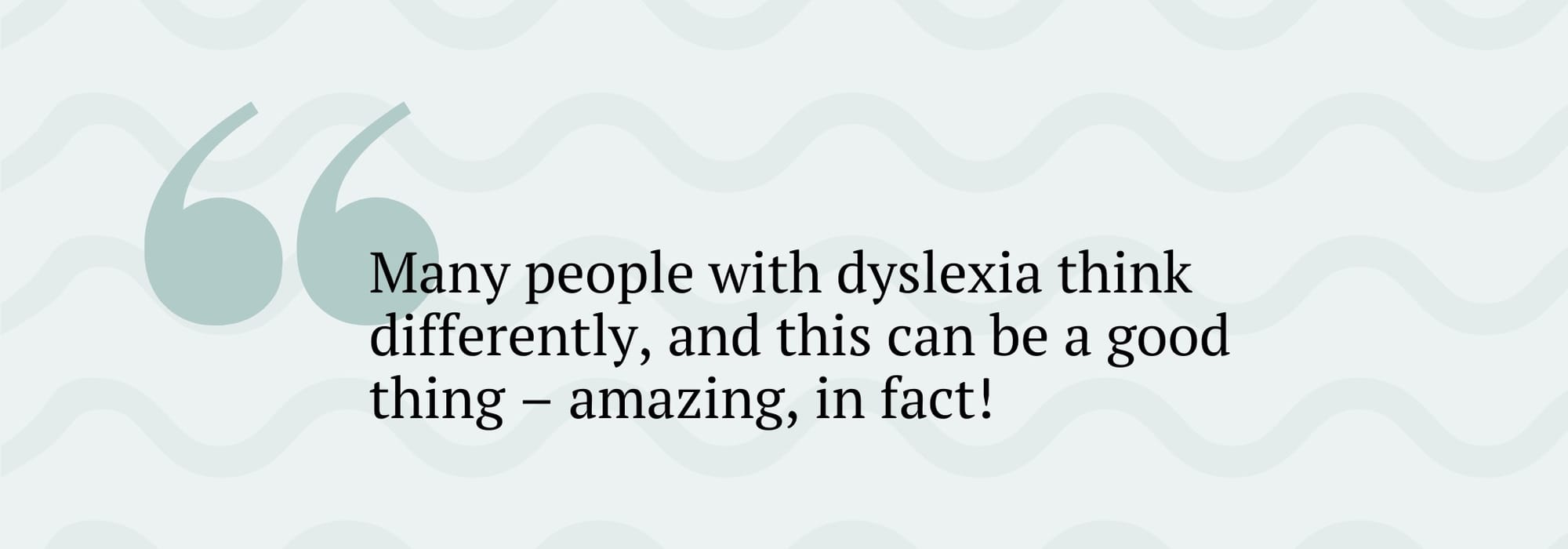Countering false claims and dispelling the unhelpful mistruths about this lifelong learning difficulty
Whether it’s being told you need to try harder, the frustration of the words on the page making no sense, jumbling the numbers in your mind, or getting self-conscious about spelling, the struggle for those with dyslexia is all too real – and yet its impact is often underestimated or downplayed.
The truth is that dyslexia is a lifelong learning difficulty that impacts writing and reading abilities, as well as other areas of a person’s life, including concentration and organisation. According to the British Dyslexia Association, it affects 10% of the UK population, with some common signs including reading slowly, misusing or forgetting words, and putting letters the wrong way around, but each person experiences their learning difficulty differently.
As a mother of a child with dyslexia, I’m familiar with the challenges of memory retention and processing speed, as well as the emotional toll of watching my son struggle at school, and the anxiety that comes with adapting to change. That said, there are many strengths to dyslexia, especially in the areas of creativity and reasoning.
Despite its prevalence, misconceptions about this learning difficulty can make it hard to grasp what’s accurate, and understand how best to support yourself or a loved one. So, let’s break down five myths, and set the record straight on dyslexia.
Myth 1: People with dyslexia can't read
Dyslexia is a neurological difference that can affect reading and writing ability, and makes these more challenging – but it doesn’t mean they can’t read. In fact, while these are the skills most affected (along with others, including organisation), dyslexia is actually about information processing in the brain. This myth might stem from the fact that, often, the first sign of dyslexia is when someone experiences problems learning to read at school. These issues have nothing to do with vision; it’s how people with dyslexia decode words. It also doesn’t have to do with another common myth that dyslexic people read backwards.
There are many features of dyslexia that can involve communication, multitasking, and organisation. And if literary skills are impacted, it doesn’t ever mean to say that a dyslexic person can’t read. They can become very accurate readers, but may struggle with comprehending or reading fluently, for example. Or it’s simply that they read differently from the typical way. There are many variations, and it’s important to avoid blanket statements as this can be dismissive and perpetuate untrue stigmas.

Myth 2: Dyslexia is something you can grow out of
It’s certainly a positive that dyslexia symptoms can improve with the proper support, and people with dyslexia absolutely can thrive, but they do not ‘grow out of it’. Working memory and fluency issues may remain difficult, even once an individual learns to read well. Dyslexia is not a case of simply trying hard to read or spell better. It affects the brain in various ways, including verbal processing speed – which means how quickly someone can understand and respond to spoken information.
Because genetic factors play a significant role in developmental dyslexia, as research notes in the Annual Review of Genomics and Human Genetics, telling someone who has this learning difficulty to ‘try harder’ only fuels the myth that it’s something you can eventually outgrow, as well as impacting their self-esteem. Often, people with dyslexia are trying harder than others already, because reading and literary comprehension isn’t something that comes naturally, and it’s exhausting to try to keep up. If you live with someone who’s dyslexic, it’s great to be mindful of their ongoing daily challenges, and the additional energy it can take to do tasks that might not even cross your mind – like reading a menu, following an instruction manual, or keeping up with a busy WhatsApp group.
Myth 3: Being dyslexic means you can't be successful
Many people with dyslexia think differently, and this can be a good thing – amazing, in fact! Even though dyslexia can impact education, getting good marks at school is more than possible, particularly with specialist interventions. But it’s also worth noting that dyslexia has absolutely nothing to do with actual intelligence, and can affect people from all walks of life.
Many highly successful people have dyslexia, including actor Jennifer Aniston, seven-time Formula 1 world champion Lewis Hamilton, and chef and entrepreneur Jamie Oliver. Even though they may not have enjoyed school, they view their dyslexia as a vital part of their achievements, with Keira Knightley saying: “It doesn’t mean that you’re stupid… It just means that you work in a different way.”
Dyslexia can foster incredible strengths, such as a unique understanding of how things work, solving problems, and thinking creatively. These can benefit entrepreneurial and innovative fields of work, and some companies actively recruit neurodivergent employees for these reasons. There are also businesses helping to educate and prepare others to actively support and get the best out of their staff, such as Positively Dyslexia, which highlights the importance of workplaces ensuring they meet the Equality Act in this area – so it’s not just on the individual to make adjustments!
. Retrieve certain words from their memory
. Read or write with accuracy
. Comprehend the meaning of language
. Meet deadlines or plan ahead
. Follow the order of letters
. Focus if there are distractions
. Accurately remember directions or instructions
. Process the sounds of syllables
. Memorise new words
. Name something with speed
. Match letters to sounds
. Tell left from right
. Remember certain dates
. Take notes or copy words
Myth 4: Dyslexia is uncommon
An estimated 780 million people in the world have dyslexia, or one in 10, which means there will likely be someone you know who has this learning difficulty. Because of the stigma associated with dyslexia, some may attempt to hide their traits, so we’re not always aware if a person around us is struggling.
My husband is undiagnosed, but displays many of the symptoms of dyslexia, and throughout his career, he’s always avoided writing in front of others to mask his struggles with spelling.
Many people are also unaware of their learning difficulty, as symptoms can be subtle or don’t fit the stereotype of being ‘unable to read or write’. With the British Dyslexia Association noting that there’s approximately 3.3 million adults in the workplace, and 900,000 children in school, dyslexia is prevalent across the spectrum of intellectual abilities, so we must support others in discussing their difficulties and needs openly. If you’re worried about your mental health as a result of dyslexia, it’s important to reach out for support.
Myth 5: Dyslexia is a myth
Something that’s incredibly unhelpful, and offensive, is the myth where people try to deny the existence of dyslexia all together. Extensive scientific research and evidence proves that dyslexia is all too real. It exists everywhere, and in different languages. There are even different types of dyslexia, including phonological (difficulty in processing the sounds of letters), and rapid naming (difficulty in naming a letter, number, colour, or object with speed). Dyslexia can be diagnosed through a diagnostic assessment carried out by a certified assessor.
Dyslexia is not, however, part of autism or attention deficit disorder (ADD). Other specific learning difficulties can co-occur with dyslexia, however it’s crucial that people with dyslexia feel validated in their individual experiences.
Ending stereotypes caused by misconceptions like these can help create a more inclusive and supportive future for people with dyslexia. Remember, you’re very likely to know someone with dyslexia, and if that person isn’t you, taking the time to understand it, and its impact, can make a huge difference in showing them the support and validation for an often overlooked learning difficulty.


Comments